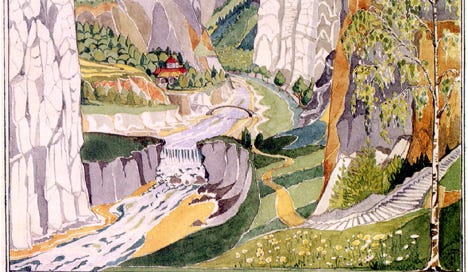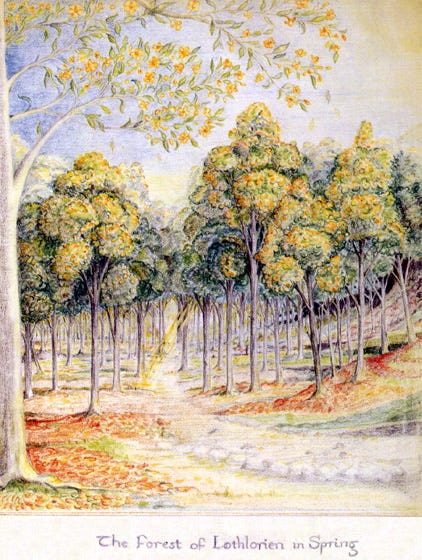What do you think of when I say ‘climate fiction’? Perhaps a dystopian story of water wars, characters fleeing resource collapse, or even futuristic solarpunk. I love all those narratives and have gobbled up literally hundreds of novels in those genres over the years.
But, working every day in climate action ain’t easy, and sometimes I don’t want to read about a dystopia that feels almost imminent. My friends with ‘normal’ jobs dip a toe into climate change news, only occasionally. If they feel particularly harried or vulnerable, they might ‘take a break from all that climate stuff’ for a while.
It’s my day job. Every email, meeting, powerpoint, video-call, conference and document is filled with triggers about cataclysmic and existential threats. So, where do I turn for solace?
For me, there is one story to rule them all. A series I’ll admit to having read over 100 times and which beloved lines from pop into my head during UN meetings and corporate workshops.
For me, the ultimate climate fiction that captures not merely the threat but the spirit we need to confront the crisis was penned long before the term "climate change" even entered public discourse. And there is so much we can learn from it about communicating climate action today.
J.R.R. Tolkien’s The Lord of the Rings wraps the solution to climate change in a narrative that trancends time. Many readers have noted that the epic is a parable for ecological destruction (and Tolkien referred to it as such in interviews). But it’s also a mythos for hope, action, and transformation in the face of overwhelming odds. This is a blueprint, with lessons in storytelling we’d do well to follow;
The Enemy Isn’t Sauron
Tolkien’s central villain, Sauron, is a force of ever-increasing domination, greed, and industrialized destruction, bent on twisting nature and people to fulfill his own ends. Sound familiar? His vast war machine isn’t just a military threat; it’s an assault on the natural world itself. The scarred and barren wastelands of Mordor could easily be a description of today’s totalitarian industrialisation.
“Here nothing lived, not even the leprous growths that feed on rottenness. The gasping pools were choked with ash and crawling muds, sickly white and grey, as if the mountains had vomited the filth of their entrails upon the lands about. High mounds of crushed and powdered rock, great cones of earth fire-blasted and poison-stained, stood like an obscene graveyard in endless rows, slowly revealed in the reluctant light.”
We have our own Mordors growing across the world; the waste-moutains, oil-spills, abandoned quarries, war-blasted cities and chemically polluted rivers.
But Sauron was never the one who scared me most as a young girl, reading LOTR under blankets far past my bedtime. Sauron was bad, but Saruman really made my skin crawl.
Sauron’s most willing accomplice, the fallen magician Saruman, offers a chillingly modern motivation for his betrayal of his old values;
“A new power is rising. Against it the old allies and policies will not avail us at all…This then is one choice before you, before us. We may join with that Power…There is hope that way. Its victory is at hand; and there will be rich reward for those that aided it:
It’s a prophetic echo of the mindset that values power over everything else. Saruman, like so many modern titans of industry, believes life is a resource to be consumed, not to be cherished. Treebeard isn’t subtle when setting out Saruman’s twisted ambitions;
“He is plotting to become a Power. He has a mind of metal and wheels; and he does not care for growing things, except as far as they serve him for the moment.”
What Tolkien saw clearly was how corruption begets corruption, even in those who didn’t start that way. A story that tends to repeat…
A few years ago, many environmentalists (including me) lauded a certain electric car entrepreneur for driving an EV renaissance. He was deep in all our councils. Then he claimed a beautiful space for himself, that had been full of tweeting birds, and swiftly debased it into a filthy pit. Now it seems his mind has been fully captured by the greed and violence offered to him. Formerly respected magicians becoming murderous side-kicks to power-hungry despots? Tolkien was precient.
The corrupting drive of greed drives so many of the dark forces in the LOTR stories - from the power-hungry kings who became ringwraiths to the stalkerish obsessions of Wormtongue.
But Tolkien carefully nudges us to the realisation that the enemy isn’t Sauron himself. The enemy is what it’s always been: an insatiable desire for power, no matter the cost to others.
The Heroes We Need
The magic of The Lord of the Rings, which makes it the ultimate climate story, is that power does not only rest in the hands of the powerful. In the final moments, it’s not the numinous Elves, mighty human warriors or even the resurrected magician Gandalf who hold the key to saving the world. Just when everything seems lost, the world is saved by hobbits: ordinary, unassuming little folk with no special powers, just stubborn hope, love for their home, and a willingness to try.
Frodo and Sam’s journey into Mordor is a masterclass in climate storytelling and even climate psychology. Time and again, they confront the sense that the task is too big, too impossible, too late. Yet, Sam holds on:
“It's like in the great stories, Mr. Frodo. The ones that really mattered. Full of darkness and danger they were. And sometimes you didn't want to know the end. Because how could the end be happy? How could the world go back to the way it was when so much bad had happened? But in the end, it’s only a passing thing, this shadow. Even darkness must pass. A new day will come. And when the sun shines it will shine out the clearer.”
This is a quote I return to again and again. I have it printed and pinned above my desk to re-read when I’m struggling with my real-world Mount Doom. Versions of this sentiment flicker at the heart of the climate movement today: youth strikers, Indigenous defenders, farmers, scientists, sustainability workers, parents and community leaders stepping up because they must - not because they are uniquely equipped, but because they care too much to do nothing. Like Sam and Frodo, they carry the burden, even though they never asked for it.
And crucially, they do not act alone. Just as the Fellowship forms across cultures, races, and languages, so does the climate movement bring together a diverse coalition of communities, all realizing that no one can solve this crisis alone.
We are our own Climate Fellowship of unexpected and mismatched allies, and that’s a beautiful thing.
One Line That Always Gets Me Sobbing
Tolkien does not shy away from the crushing scale of the task. Climate fiction, too, must grapple with the enormity of the rising seas and burning forests, and the existential weight of planetary crisis. Sam feels it when they stumble through Mordor:
“I can’t carry it for you, but I can carry you.”
That single line is the distilled essence of climate solidarity. No one can carry the crisis alone, but we can carry each other through it.
Nature That LIVES
The Lord of the Rings is widely recognised as ‘eco-fiction’ for its reverence for the natural world.
From the golden woods of Lothlórien to the wild, untamed peaks of the Misty Mountains, Tolkien’s landscapes aren’t just backdrops, they are characters with stories, wisdom, and intrinsic value.
The natural world in Tolkien’s world is sacred and ancient, and it is worth saving not because of its utility but because of its inherent beauty and mystery.
Of course, Tolkien himself was deeply disturbed by the impacts of industrialisation when he wrote, "The country in which I lived in childhood was being shabbily destroyed before I was ten." But he still manages to see the magic incarnate within nature and when we read Lord of the Rings, perhaps we do too.
Re-making The Shire
One essential part of The Lord of the Rings is that it does not end with a return to the status quo. The world isn’t ‘returned’ to the same state. With the Scouring of the Shire, the hobbits return home to find their beloved land ravaged by Saruman’s last gasp of industrial cruelty. But they do not despair. They rebuild. Not exactly as before, but better. With soil and a seed from Galadriel’s garden, Sam replants the trees, including a single mallorn, the only one of its kind in the Shire;
When the tree bloomed in the next summer it was said that all the Shire became golden from the flowers
The future can’t just be a desperate clawing back to the past but a transformed world, richer for the struggle it has endured.
A Timeless Climate Story
Tolkien understood a profound insight: that the fight for the future of the earth is not fought in grand gestures but in small acts of courage, stubborn hope, and deep love for place and people. Unexpected allies can be the real magic to change the course of even the worst crisis.
That is the heart of all great climate stories. They don’t just warn us of impending catastrophe, but they remind us that we are part of a great, unfolding tale. One where our ending is still unwritten.
“I wish it need not have happened in my time,” said Frodo.
“So do I,” said Gandalf, “and so do all who live to see such times. But that is not for them to decide. All we have to decide is what to do with the time that is given us.”
[Thank you for reading. Please comment with your favorite climate fiction and why it moves you! And of course, please subscribe and share with others - hantanyë tyen]






Oh my goodness, so much of this yes! I am not sure if I wasn't in part shaped into a climate activist by Tolkien... This story and the quotes that are burned into my psyche certainly shapes how I face it... I can't ever give up because... Well mostly because of Frodo and Sam... And if I look then I can find real life stories and quotes to go along with them like Nelson Mandela's "it's only impossible until it's done" .... But my heart, my heart believes it because of Frodo and Sam 💚
Thank you for helping me see LOTR in this light!